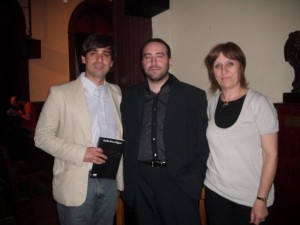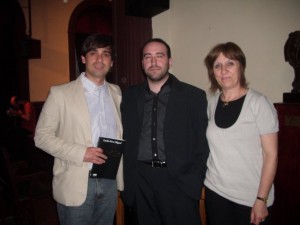(Hagan click aquí para leer este artículo en español)
I would like to share with you the speech that Fabián Severo gave at the launch event for my book, “Once”. Fabián is a literature teacher and a writer. He has recently been involved in the launch of a book written with secondary school children named “Fruto Del Desierto” [The Fruit Of The Desert], and a second volume named “Huellas de viento en la arena” [Traces Of The Wind In The Sand] has just been completed.
I thank him warmly for being there that day, and for the speech he gave.
His blog is found here:

With Fabián Severo (Left) And Publisher Carmen Galusso (Right).
“It is a great joy to take part of the launch of a book of poems because I feel that poetry is the one literary genre that gives readers the biggest interpretative freedom. It brings us the maximum of feelings, emotions and ideas in a minimum of words.
Those who teach at institutes of education have always tried to make us believe language is noting but an instrument, and they taught us its functions. Ivonne Bordelois once wrote “we are forgetting that a language is above all a pleasure – a sacred pleasure – and probably the highest form of love and knowledge”. Language itself is free, democratic, sympathetic and revolutionary. Free and democratic because it reaches everybody at no cost. Sympathetic because it us a meeting point – a whole community shares it. And revolutionary because through it norms are trespassed and innovations arise. “And it is poets – along with children –the ones who notice the ample and secret possibilities that a language brings, and they either toy with it or become its toys.”
Emilio Pérez Miguel defines in a beautiful line one of the roles a poet plays out: “dar vos a lo que otro siente” [voice what other feels]. When one reads “Once”, in some of his poems, verses and quotes one is bound to find a feeling, a reflection or an idea that belongs to him.
Emilio Pérez has managed to surprise with this book. He has managed to trespass some frontiers. He has modified the conventional structure of books – there is no foreword, there is no index, after the introduction we go straight into the second chapter and we stay there, strolling through poems that change from one day to the other, that combine two titles, that pose questions that are answers. We read definitions, concepts, footnotes. Continue reading

